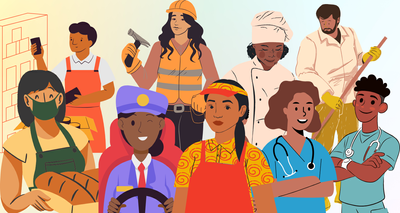A Mexican pharmaceutical chemist got fired for trying to save her baby. She and other Latinas who have suffered prejudice and sexism in the workplace fight against it in the U.S. Here are some examples.
Even though female workers amount to 51 percent of American professionals, it is a well-known fact that they get paid less than men. This is even worse for Latinas who experience the pay gap is so vast they only receive 52 cents of a dollar of a non-Latino white man’s wage. Their access to qualified positions is also lower.
But income isn’t all that matters. According to a 2022 report from Women in The Workplace, Latinas feel less supported by their managers and tend to be more penalized for mistakes than women from other ethnicities. This biased attitude usually ends in grave actions, such as termination from their place of work. This is exactly what happened to Rosa Linda Soriano Torres, a pharmaceutical chemist from Mexico who got fired for pregnancy-related complications.
Soriano’s Fight for Her Baby’s Life
In August 2023, Rosa Linda Soriano Torres was the victim of a sexist and xenophobic trap that made her choose the impossible: her job or her baby.
According to The Atlanta Journal-Constitution, Soriano Torres and her husband emigrated from Mexico City to West Point, Georgia to live the American dream ―Or so they thought. Thanks to a TN visa, she was promised an engineering job by the logistic firms GFA Alabama and Glovis Georgia, but what she found was nothing of the sort.
Despite her expertise, the Latina worker ended up on a job with a heavy physical toll, which consisted of moving large car parts. The heavy lifting, plus a smaller wage than what was promised, left a bitter taste in Soriano Torres’ mouth.
“It was not at all like what they had described,” Soriano Torres told the newspaper. Unfortunately, the couple was forced to keep their job so as not to compromise their legal status in the U.S.
When Soriano Torres found out she was pregnant, her blissful moment quickly became a nightmare. After experiencing two incidents of vaginal bleeding, it was clear she needed a light-duty role within the company. However, when she talked to her employer, she was told that what she had done (i.e. getting pregnant) was “very wrong”. Management even said there wasn’t a record of a pregnant worker with a TN visa being hired and that she “should return to Mexico” to continue her pregnancy.
After this, Soriano Torres faced many setbacks. For example, her request to attend a prenatal visit was delayed for three weeks and she got a disciplinary report a month after leaving her station.
“I noticed that no other employee who left their workstation received a disciplinary report. I believe the GFA managers issued me a disciplinary report in retaliation for my pregnancy and my request for a lighter-duty job,” Soriano stated to The Atlanta Journal-Constitution. The Latina worker was terminated shortly after that incident, during her first doctor’s appointment.
When she lost her job, the couple now faced deportation from the U.S. This led her to file an EEOC complaint against GFA for pregnancy discrimination. During that process, Soriano Torres met another woman in the same position who suffered a similar fate who told her “She told me her supervisor did not want to change her shift because she was pregnant. She had multiple vaginal bleeds and eventually miscarried.”
As she waits for both the verdict and her due date, Soriano Torres hopes her actions can shed light on the situation many Latina immigrants suffer when coming to the U.S. without knowing the systematic pattern of violence that awaits them.
Other Cases of Pregnancy Discrimination
Joselyn Izurieta Ulloa
In 2019, Joselyn Izurieta Ulloa, a young Latina from Long Island, lived through a similar situation. She was a waitress in the well-known restaurant chain Hooters, famous for it's objectification towards its female servers. Ulloa’s case was no exception, as she was fired only one week after she informed her boss she was pregnant. The response she got was not at all what she expected: “Oh great, so now there are three pregnant girls in Hooters. [...] We are going to look like a circus.”
The termination was justified by a negative complaint from a customer, who said she served them a cold meal. Ulloa claims it never happened. However, according to her attorney, “other waitresses have gotten bad reviews and were not fired for it.” For instance, two white servers skipped work to attend the Super Bowl, yet nothing happened. This double standard led her to file a complaint with the State Division of Human Rights. The Latina was devastated. “I was very offended and upset. The day I got fired, I left the office crying. It was my only job,” she said.
Ulloa described many horrific situations towards Latina employees. For example, she noticed a racist practice from one of her managers who chose only white waitresses to serve other white clients during golf promos. When she asked her superior why, she claims their response was: “Because golf promos are full of old, white men with money who are only attracted to 'open-minded' white girls and I need to keep business running.”
In short, Hooters refused to defend Latinas against their customers’ discrimination. Ulloa saw how a white man yelled “Spanish b-tch” to one of her colleagues while her manager did nothing. White waitresses got away with stuff Latinas were being reprimanded for… but also suffered more sexual abuse from superiors. This restaurant chain was held accountable on multiple occasions for racial discrimination, but it seems nothing has changed.
Zoe Saldana
Yes, even Zoe Saldana, a Hollywood actress who starred in box office smashes like Avatar and Guardians of the Galaxy, almost got fired for being pregnant. In 2014, the American actress, with Dominican and Puerto Rican heritage, found out she was expecting twins. It was a dream come true, but the productions with whom she had active contracts begged to differ.
According to an interview with USA Today, Saldana said they freaked out when they learned the big news.
“I heard through the grapevine there was even a conversation of me being written off of one of the projects,” said Saldana to USA Today.
Of course, the actress couldn’t believe it and decided to stand her ground.
“Right when I just feel super-duper happy, is that inconvenient for you? That me, as a woman in my thirties, I finally am in love and I am finally starting my life? And it’s (screwing) your schedule up? Really?”
Even though the issue was finally resolved, Saldana commented on the difficulties of getting child care economically contemplated by production. Again, the double standard became visible, studios offer male actors luxury items but can’t afford a nanny.
“Okay, I have a child. You’re taking me away from my home. You’re taking my children away from their home. And you’re going to make me work a lot more hours than I usually would if I was home; therefore, I would have to pay for this nanny for more hours so I kind of need that,” said Saldana in her own words.
Saldana’s case is proof that pregnancy discrimination affects all socioeconomic sectors. However, Latinas and other People of Color usually have a harder time facing their employers.
After reading about the terrible situations these Latinas have gone through, it is clear no woman should have to choose between her family and her job. If you are pregnant and have been laid off or have suffered discrimination, remember there are federal laws that can protect you. Let’s fight sexism and xenophobia for a better workplace for women!






